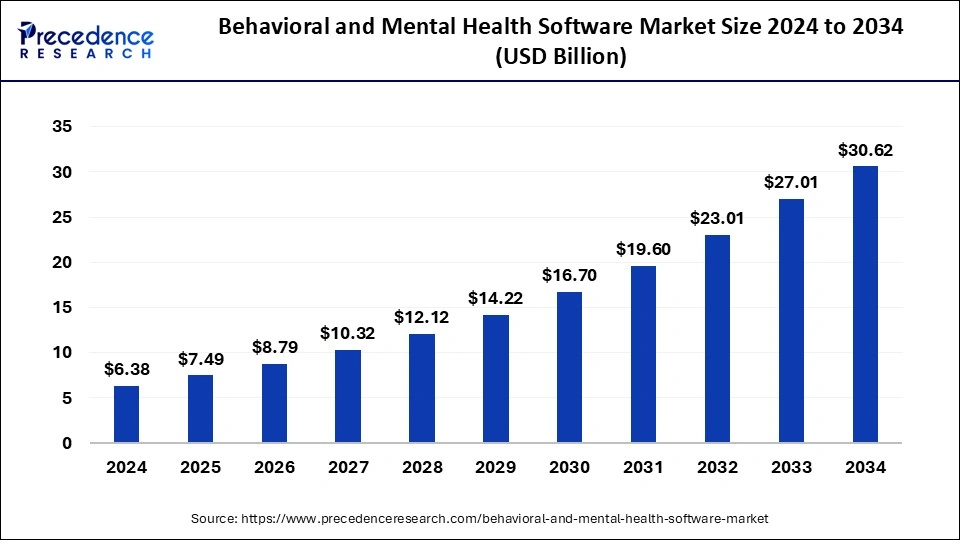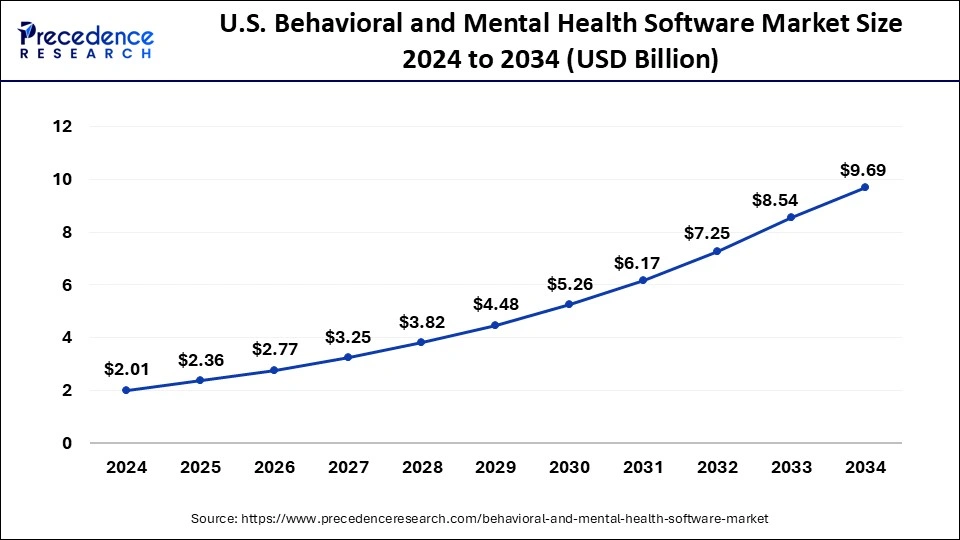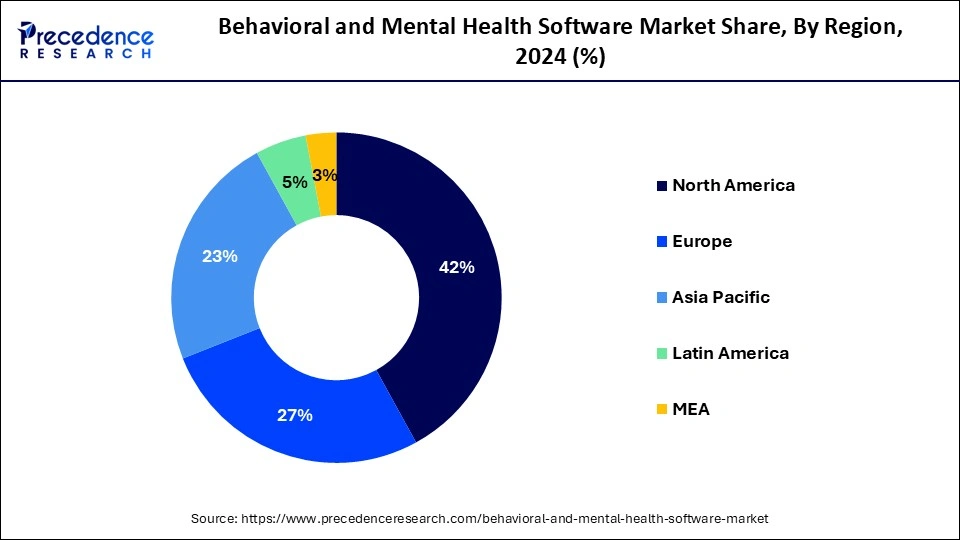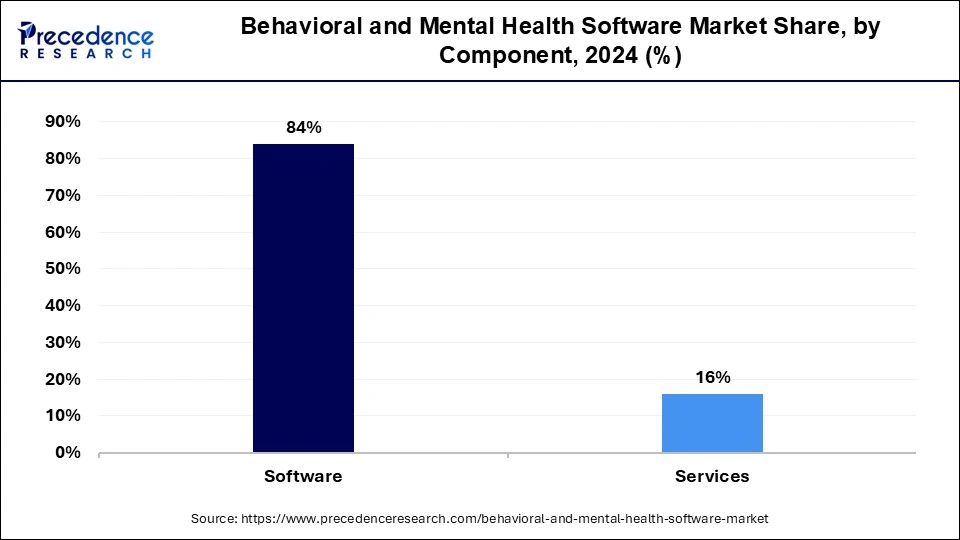Behavioral and Mental Health Software Market Size and Forecast 2025 to 2034
The global behavioral and mental health software market size was calculated at USD 6.38 billion in 2024 and is predicted to increase from USD 7.49 billion in 2025 to approximately USD 30.62 billion by 2034, expanding at a CAGR of 16.98% from 2025 to 2034. The growing awareness of mental health among the people and supportive government policies for the mental well-being of the people are driving the growth of the behavioral and mental health software market.

Behavioral and Mental Health Software MarketKey Takeaways
- The global behavioral and mental health software market was valued at USD 6.38 billion in 2024.
- It is projected to reach USD 30.62 billion by 2034.
- The behavioral and mental health software market is expected to grow at a CAGR of 16.98% from 2025 to 2034.
- North America dominated the market with the largest market share of 42% in 2024.
- Asia Pacific is expected to expand at the fastest CAGR of 13.44% during the forecast period.
- By component, the software segment has contributed more than 84% of revenue share in 2024.
- By application, the clinical segment has generated more than 52% of revenue share in 2024.
- By application, the administration segment is expected to grow at the fastest rate during the forecast period.
- By end-user, the private practices segment held the highest market share in 2024.
U.S.Behavioral and Mental Health Software Market Size and Growth 2025 to 2034
The U.S. behavioral and mental health software market size was exhibited at USD 2.01 billion in 2024 and is projected to be worth around USD 9.69 billion by 2034, growing at a CAGR of 17.03% from 2025 to 2034.

North America dominated the behavioral and mental health software market share of 42% in 2024. The growth of the market in the region is attributed to the rising technological advancements in the healthcare infrastructure and the rising economic development in countries like the United States and Canada, which are increasing the per capita income and surging the expenditure in healthcare. The rising cases of mental health disorders and the increasing awareness among people for the treatment of mental health disorders are driving the growth of the market. Additionally, the supportive government policies favoring the mental well-being of individuals are boosting the growth of the market across the region.
- The United States experience 23.1% in the mental health condition in 2022, in which 6% of the individuals experienced a serious mental health condition. 5.2 million veterans will experience behavioral health condition in 2022.

Asia Pacific is expected to witness significant growth in the market during the forecast period in the behavioral and mental health software market. The growth of the market in the region is expected to increase due to the rising population, increasing investment, and supportive policies for the development of healthcare infrastructure. The rising cases of mental health disorders due to stressful lifestyles, environmental challenges, etc., are driving the cases of mental health illness that drive the demand for behavioral and mental health software. The expansion of applications like telehealth is further propelling the growth of the behavioral and mental health software market in the region.
- According to a recent survey, the younger generation of China is affected by the risk of depression.
- According to the report published in 2023 by China's Centers for Disease Control and Prevention found that 21.08% of college students at Shandong University have experienced traumatic events.
Europe is observed to grow at a considerable growth rate in the upcoming period due to heightened awareness of mental health issues and an increasing demand for digital therapeutic solutions. Government initiatives that promote mental health programs and the integration of telehealth platforms are accelerating their acceptance throughout the region. The shift towards remote care after the pandemic has also motivated behavioral health providers to adopt software solutions for tasks such as patient monitoring, appointment scheduling, and maintaining electronic health records. Furthermore, advancements in AI-driven therapy tools and a growing investment in healthcare IT infrastructure are driving market growth across Europe.
Germany is experiencing robust development in the market for behavioral and mental health software, aided by progressive digital health policies and a high incidence of mental health disorders. The country has adopted telepsychiatry and app-based therapy solutions in line with its digital health legislation. Healthcare providers are increasingly leveraging software platforms to manage patient records, facilitate remote consultations, and deliver individualized care, leading to enhanced access and efficiency in the delivery of mental health services.
Market Overview
Behavior and mental health software is commonly referred to as an application that looks after people's mental health. It is designed to maintain and support mental well-being. The behavior and mental health software and applications may be supported on gadgets like tablets, smartphones, and computers. The mental health application provides a wide range of functionalities and features for assisting people or the person suffering from the condition in managing their mental health. Mental health apps can support valuable insights for professionals in therapy or counseling practices. It is also used to track and monitor the progress of clients, allowing easy access and communication between clients and professionals.
The increasing adoption of software management tools for patient healthcare, government funding for the treatment of mental reforms, and the increasing number of psychiatry hospitals and facilities are collectively contributing to the growth of the behavioral and mental health software market.
Behavioral and Mental Health Software Market Growth Factors
- The increase in mental health cases due to the rising stressful lifestyle, rising work pressure, and environmental changes that result in a higher number of psychic cases drives the demand for behavioral and mental health software and drives the growth of the market.
- The increasing awareness among people of mental well-being and the people opening up about their mental health, like depression, anxiety, etc., are driving the demand for behavioral and mental health software.
- The rising investments by private and public investors for the development of technology that captures mental illness and other problems associated with it boosts the growth of the behavioral and mental health software market.
- The increasing adoption of behavioral and mental health software by professionals for maintaining and managing the patient or client's mental health is fueling the growth of the market.
- The supporting healthcare policies by the various regional governments across the world and the rising healthcare infrastructure are driving the growth of the behavioral and mental health software market.
Major Key Trends in Behavioral and Mental Health Software Market
- Increased Use of Telehealth Platforms: Mental health professionals are progressively using telehealth tools to provide virtual consultations, broadening patient access, especially in remote regions, and enhancing the continuity of care.
- AI-Enhanced Diagnostic Tools: The integration of AI and machine learning facilitates personalized treatment plans, predictive analytics for early intervention, and improved patient outcomes in the area of behavioral health.
- Shift to Cloud-Based Deployment: The market is moving towards cloud-based software solutions for better scalability, enhanced data accessibility, and lower IT costs, making these solutions more practical for smaller and mid-sized mental health practices.
Market Scope
| Report Coverage | Details |
| Growth Rate from 2025 to 2034 | CAGR of 16.98% |
| Market Size in 2025 | USD 7.49 Billion |
| Market Size by 2034 | USD 30.62 Billion |
| Base Year | 2024 |
| Forecast Period | 2025 to 2034 |
| Segments Covered | Component, Applications, and End-user |
| Regions Covered | North America, Europe, Asia-Pacific, Latin America, and Middle East & Africa |
Market Dynamics
Driver
Development of telehealth
The rising adoption of telehealth is highly contributing to the growth of the market. Telehealth allows individuals to access mental health services in the comfort of their homes, without any transportation or break from work. It is considered for long-term treatment plans, though it enables the safer and more convenient option for in-person appointments. Telehealth can be accessed from devices like smartphones, tablets, etc., by combining digital tools with smartphone apps; the users can also take advantage of guided medications, mood tracking, and self-help resources, which drive mental well-being. Thus, all these factors are driving the growth of the behavioral and mental health software market.
Restraint
Data security issues
Growing trends of digitalization across various industries have been observed over the past few years. As cloud storage and processing of data has become widely accepted, cases of data breaches have been observed worldwide. In the behavioral and mental health software market that involves sensitive and private data, lacking cyber security and data theft have become significant concerns. The increasing cases of data infringements, cybercrimes, and data leakage are hampering the growth of the market by creating distrust among consumers and other end users. Thereby, such security concerns act as a major restraint for the behavioral and mental health software market.
Opportunity
Personalized or custom-made behavioral and mental health software
Personalized or custom-made behavior and mental health software provide many benefits to the professionals as well as the patient. Personalization allows user experience, which drives the consumer experience, increasing engagement. It designed efficient features to incorporate the advanced functionalities and features that meet the specific demands of mental health challenges. This feature provides valuable insights and resources to support the users and empower them in their mental health journey. Thus, the rising demand for custom-made mental health apps or software opens up a potential opportunity for the behavioral and mental health software market.
Component Insights
The software segment dominated the behavioral and mental health software market share of 84% in 2024. The growth of the segment is attributed to the rising adoption of software tools in the psychic clinics for streamlining the business and patient care functions. The rising demand for electronic solutions for managing administrative processes and clinical functionalities is driving the demand for the segment. Software solutions likeelectronic health record (HER) systems allow patients to access more data from anywhere. Behavioral and mental health software is also used to maintain and manage data like invoices, bed availability in hospitals, appointments, billing, etc., which is efficient in running the business smoothly.

Besides, the services segment is observed to expand at a significant rate during the forecast period. Behavioral and mental health software needs to evolve to meet changing regulatory requirements and technological advancements. Services providers offer updates and upgrades to ensure that the software remains relevant and effective. Compliance with healthcare regulations is often critical in such industries. Service providers offer assistance in ensuring that the software meets regulatory requirements.
Applications Insights
The clinical segment dominated the behavioral and mental health software market in 2024. The rising consumption of behavioral and mental health software in clinical applications for various administrative services supports the segment's expansion in the market. Behavioral and mental health software provides services like documentation, billing, claim filing, coding, appointment scheduling, etc. The cases of psychic conditions and the increasing number of patients are driving the demand for behavioral and mental health software in clinics for the management of data that accelerates the growth of the behavioral and mental health software market.
The administration segment is expected to grow at the fastest pace in the behavioral and mental health software market during the forecast period. The segment is further divided into managed care, RCM, payroll, and general ledger. The growth of the segment is attributed to the growing demand for the essential software application to view multiple providers in a single place. The rising adoption of RCM platforms, continuously changing reimbursement scenarios, and the rising cost of care are driving the demand for behavioral and mental health software in the administrative segment.
End-user Insights
The private practices segment held the largest share in behavioral and mental health software market in 2024. The increasing number of cases of mental health conditions like anxiety, depression, and post-traumatic stress disorders in the population resulted in the increasing number of counselors or professionals providing the services in private, fueling the growth of the segment. Additional digital transformation in the healthcare sector has widely helped private practitioners to help the rising number of mental health cases in the population. The increasing lifestyle changes, eating and sleeping habits, and work stress resulted in increased cases of depression and anxiety in the population, and the rising awareness of mental health drove people to get help for mental health issues from professionals or private practitioners.
The hospitals segment is observed to witness the fastest rate of expansion during the forecast period. Many hospitals are affiliated with academic institutions, which conduct research and offer training in mental health care. These institutions require specialized software for research data management, training simulations and educational purposes. Hospitals typically served larger patient populations compared to individual practices, necessitating robust software solutions to manage the high volume of patient data and appointments efficiently.
Recent Developments
- In June 2024, Talkspace partnered with FitOn to launch the first-ever mental health sessions in the app and promote mental fitness. The aim is to meet the wellness & health needs of a dynamic & diverse population. The app consists of a psychoeducational in-app series and provides FitOn members access to digestible information. (Source: https://www.businesswire.com)
- In October 2024, athenahealth launched athenaOne for behavioral health. The solutions offer practice & revenue management solutions, EHR, and patient engagement. The solution increases efficiencies and reduces administrative burden. It enhances care coordination and improves patient engagement.(Source: https://www.businesswire.com)
- In January 2025, Eleos Health raised $60 million in series C funding to develop artificial-intelligence-based tools for behavioral health providers. The company will focus on expanding its product, and the company uses a multimodal large language model. (Source: https://www.fiercehealthcare.com)
- In April 2025, NextGen Healthcare launched an AI-driven efficiency solution for behavioral & mental health professionals. It is available for prescribers and psychiatrists in the behavioral health space. The features include seamless integration, clinical context, 100% technology-based, complete automation, and auto-deletion of audio & transcripts. (Source: https://www.businesswire.com)
- In April 2024, Talkspace, an online behavioral health company, launched its Behavioral Health Consortium, a network of specialized providers that includes Ria Health, Charlie Health, and Bicycle Health. This consortium allows Talkspace clinicians to refer insured members to a clinically vetted network of similarly focused specialty care providers who deliver a higher standard of care for the treatment of substance use disorders, alcoholism, and eating disorders. (Source - https://investors.talkspace.com)
- In February 2024, the Substance Abuse and Mental Health Services Administration (SAMHSA) formed a partnership with the Office of the National Coordinator for Health Information Technology (ONC). Over the next three years, the two organizations committed more than USD 20 million in SAMHSA funds to enhance health information technology (IT) in the realm of behavioral healthcare.(Source - https://www.healthit.gov)
- In April 2025, Teladoc Health acquired mental health company UpLift for USD 30 million. This strategic move aims to strengthen Teladoc's BetterHelp division, which has encountered difficulties recently. By incorporating UpLift's capabilities, Teladoc aims to enhance its presence in the digital mental health arena and provide a more comprehensive range of services to its clients. (Source - https://www.cnbc.com)
- In February 2024, the Substance Abuse and Mental Health Services Administration (SAMHSA) collaborated with the Office of the National Coordinator for Health Information Technology (ONC) with the aim of launching advanced behavioral health IT interoperability.
- In February 2024, Syra Health Corp., a healthcare technology solution organization aiming to enhance healthcare by providing technology solutions and innovative services, invited entries to the Syra Health Mental and Behavioral Health Solutions Award.
- In January 2024, Illinois collaborated with Google to launch the BEACON mental health portal. Illinois is taking part in some of the mental health initiatives.
- In January 2024, the Illinois Department of Human Services collaborated with Google to launch the latest centralized portals for children's mental health care.
- In February 2024, DarioHealth Corp. announced it overtook Twill Inc., a leading player in digital-led care.
Behavioral and Mental Health Software Market Companies
- Cerner Corporation
- Core Solutions, Inc.
- Epic
- Meditab
- Holmusk
- Netsmart Technologies
- Qualifacts Systems, Inc.
- Welligent, Inc.
Segments Covered in the Report
By Component
- Software
- Services
By Applications
- Clinical
- Administrative
- Financial
By End-user
- Private Practices
- Hospitals
- Community Clinics
By Geography
- North America
- Europe
- Asia-Pacific
- Latin America
- Middle East and Africa
For inquiries regarding discounts, bulk purchases, or customization requests, please contact us at sales@precedenceresearch.com
Frequently Asked Questions
Ask For Sample
No cookie-cutter, only authentic analysis – take the 1st step to become a Precedence Research client
 Get a Sample
Get a Sample
 Table Of Content
Table Of Content
 sales@precedenceresearch.com
sales@precedenceresearch.com
 +1 804-441-9344
+1 804-441-9344
 Schedule a Meeting
Schedule a Meeting